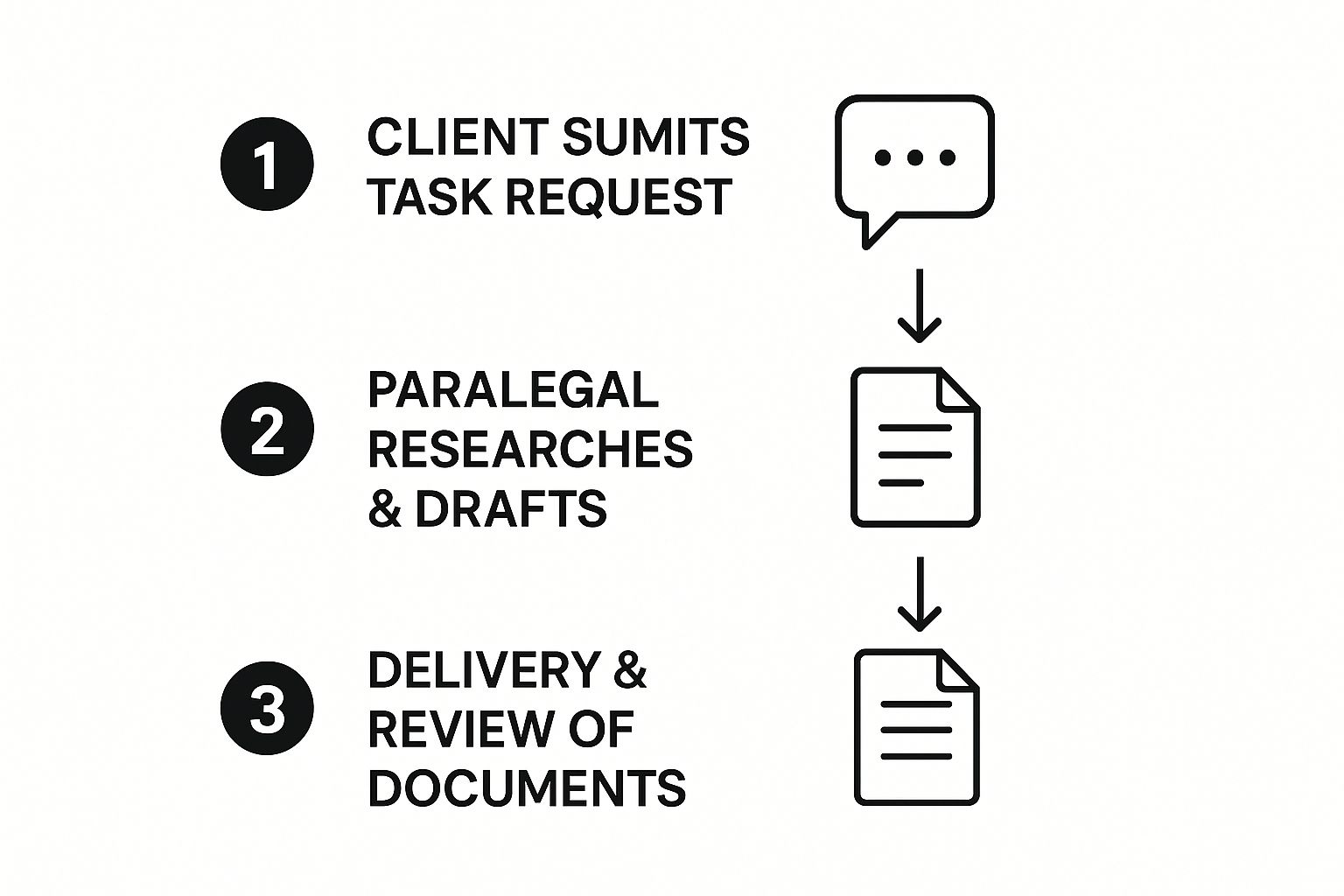
 20 minutes read
20 minutes read
Let’s be honest. Hiring a paralegal isn’t just about adding headcount; it’s a desperate move to plug the hidden financial leaks in your firm before you have to start mortgaging the office ping-pong table. The right paralegal for hire can instantly free up your attorneys, streamline the chaos, and mitigate those terrifying compliance risks—directly boosting your bottom line.
Let’s get real for a minute. Your firm is bleeding cash in ways that don’t show up on a neat P&L statement. I’m not talking about fancy lunches; I mean the slow, painful drip of inefficiency that drains profitability, one wasted hour at a time. It’s the cost of having your highest-paid people—your attorneys—doing work a trained monkey could handle.
Every time an attorney spends twenty minutes formatting a document, chasing a signature, or organizing a case file, you're literally lighting money on fire. That's six-figure talent being squandered on ten-dollar-an-hour tasks. You hired them for their legal brilliance, not their administrative prowess. Hope you enjoy spending your afternoons fact-checking routine filings—because that’s now your senior associate’s part-time job.
Think about those "quick" five-minute tasks. An attorney's time might be billed at $500 an hour. That "quick" document search isn't free; it's a $40 expense. That "simple" client follow-up call? Another $40. These costs multiply throughout the day, across every attorney in your practice. It’s the silent killer of profitability.
This isn’t just about lost billable hours. It’s about opportunity cost. The time an attorney spends on administrative drag is time they aren't spending on case strategy, client acquisition, or mentoring junior staff. This is where the real financial damage happens, crippling your firm’s growth potential.

The truth is, many firms are so used to this operational friction they don't even see it as a problem. They call it "the cost of doing business." It’s not. It's the cost of doing business inefficiently.
Beyond the obvious financial drain, there are deeper risks. Disorganized files lead to missed deadlines. Haphazard client communication damages relationships. Overburdened attorneys are far more likely to make critical errors, creating compliance nightmares that can cost your firm its reputation and a fortune in penalties.
This is exactly why the demand for specialized legal support has exploded. The global market for paralegal services has shown consistent growth as firms wise up to the need to delegate. Rising legal complexities and a drive to reduce costs are pushing smart firms to find a paralegal for hire not as an expense, but as a critical investment. To dive deeper into this trend, check out a detailed market report on the growing paralegal services industry.
The table below breaks down some of these often-overlooked expenses that pile up when you delay getting proper support.
| Hidden Cost | What It Looks Like | Potential Financial Impact |
|---|---|---|
| Lost Billable Hours | Attorneys spending hours on non-billable tasks like document formatting, scheduling, or e-filing. | Thousands of dollars in lost revenue per attorney, per month. |
| Opportunity Cost | Senior partners bogged down in administrative work instead of developing new business or mentoring associates. | Stagnant firm growth and missed client acquisition opportunities. |
| Increased Risk of Errors | Overburdened attorneys rushing through filings, leading to typos, missed deadlines, or compliance breaches. | Malpractice claims, reputational damage, and costly sanctions. |
| Poor Client Experience | Delayed responses to client inquiries because attorneys are too busy with administrative tasks. | Client attrition and negative reviews that deter future business. |
| Attorney Burnout | Talented legal professionals feeling overwhelmed and undervalued, leading to high turnover rates. | High recruitment and training costs to replace experienced staff. |
Seeing it laid out like this makes it pretty damn clear: the cost of inaction is far greater than the investment in a skilled paralegal.
Hiring a paralegal is your first line of defense against these hidden costs. It’s about reclaiming attorney time, sharpening your firm's operational focus, and protecting your bottom line. Curious about the numbers? Understanding typical virtual paralegal rates can help you budget for this essential role. This isn’t about adding another salary; it’s about making a strategic investment that pays for itself almost immediately.
Alright, let's talk sourcing. If your master plan is to throw a generic job post onto Indeed and pray for the best, I’ve got bad news for you. You’ll spend your afternoons fact-checking resumes and interviewing candidates who think "litigation support" means making sure the printer has paper.
That approach is a recipe for wasting weeks, only to end up with a C-player. You know, the kind of hire you regret three weeks in.
Finding a top-tier paralegal isn't about casting the widest net; it's about fishing in the right ponds with the right bait. The best candidates aren't desperately scrolling through massive job boards. They’re selective. Many are already employed but keeping an eye out for something better. Your job is to make your opportunity impossible for them to ignore.

First, let’s be honest about the old standbys. LinkedIn can feel like shouting into a void, absolutely packed with recruiters and candidates who apply to everything with a single click.
And traditional staffing agencies? They can be a costly gamble. You pay a hefty fee, and they send you whoever is at the top of their pile—not necessarily the best fit for your firm’s unique culture. It’s a numbers game for them, but it’s your firm’s future on the line.
We've all been there, paying a massive percentage of a first-year salary only to find out the "perfect" candidate they found has the tech skills of a toaster. No thanks.
This is where the game changes. You need to go where the serious professionals gather. My battle-tested advice? Focus on niche platforms.

The goal isn't just to find someone with a certificate. It's to find someone who is actively invested in their career, and those people hang out in professional circles, not on generic job sites.
Now, let's talk about the bait. Your job description is your most powerful filtering tool. A bland, corporate-speak description attracts bland, uninspired candidates. You need to write something that acts as both a magnet for the right person and a repellent for the wrong one.
Stop listing duties. Start describing challenges and outcomes.
Instead of this: "Responsible for managing case files."
Try this: "You'll own our case files from intake to closing, building ironclad systems that our attorneys can rely on under pressure."
This small shift in language shows you respect the role and challenges ambitious candidates to prove they can deliver results. It tells the clock-watchers to look elsewhere.
Be unapologetically you. Are you a fast-paced litigation shop? Say so. A detail-obsessed IP practice? Make that clear. This ensures you’re talking to people who are already excited about the specific challenges you offer. And if you're open to it, mentioning virtual paralegal employment can be a huge selling point, blowing your talent pool wide open.
Let’s be brutally honest: a polished resume doesn't mean much. I’ve been burned more times than I care to admit by candidates who interviewed like rockstars but performed like amateurs. Their CV was a masterpiece of creative writing, but their actual work was a train wreck.
This is the stage where you separate the contenders from the pretenders. Hope you enjoyed sourcing, because now the real work begins. We’re going to pressure-test their skills, not just have a friendly chat about their five-year plan. Get this part wrong, and your new hire becomes your new full-time job.

Forget hypothetical questions for a moment. The single most important step in my vetting process is a "take-home" practical skills test. This is non-negotiable. It’s a short, paid assignment that mimics the actual work they’ll be doing.
Why paid? Because their time is valuable, you’re not looking for free work, and it shows you’re serious. You’re making a small investment to avoid a very expensive hiring mistake. This is where you’ll see their real-world abilities in legal research, document drafting, and attention to detail.

A candidate’s response to a skills test tells you everything. The A-players are eager to prove their abilities. The ones who make excuses or ghost you? They just saved you a world of future headaches.
Here are a few examples:
A focused task that takes two to three hours is all you need to see their true capabilities shine through—or not.
Once a candidate passes the skills test, it’s time for the interview. I'm not talking about asking, "What's your biggest weakness?" Those questions just invite canned, meaningless answers. Instead, hit them with scenarios that reveal their problem-solving skills and ethical judgment under pressure.
You’re not just looking for any paralegal for hire; you want someone who can think on their feet.
Here’s the kind of thing I ask:
Their answers reveal their understanding of professional ethics, their communication style, and their ability to manage chaos. You can't fake your way through these. For even more ideas, our guide on legal assistant interview questions provides a great starting point.
Keep in mind that paralegals with skills in eDiscovery, intellectual property, and data privacy compliance are in high demand. Specialized knowledge in areas like immigration or ESG regulations also creates significant opportunities. Test for the specific, high-value expertise you actually need.
This multi-stage vetting process—resume screen, practical skills test, and scenario-based interview—might seem like a lot of work. It is. But trust me, it’s a fraction of the work you’ll face if you make the wrong hire.
You’ve done the hard work. You’ve sifted through resumes, run the skills tests, and finally found The One. Now, for the love of all that is holy, don’t mess it up with a clumsy offer.
This is where a great hiring process can completely fall apart. A lowball offer or a vague job description can make a star candidate feel instantly undervalued, sending them running straight to your competitor. This isn't just about throwing money at them; it's about presenting a clear, compelling vision of their future at your firm.

Sure, compensation is king. You absolutely need to be competitive. But the best candidates—the ones you actually want—are looking for more than just a number.
They're looking for a career, not just a job. Your offer needs to reflect that.

The offer letter is your final sales pitch. It should scream, "We see your value, and we want to invest in you." Anything less, and you're just another line item on their spreadsheet of potential employers.
Now, let's talk about the elephant in the room: remote work. The pandemic proved that remote paralegals can be incredibly productive, but now the herd is moving back to the office, and many firms are following suit without a second thought.
This is a massive strategic decision, and just "following the crowd" is a terrible reason to make it. One of the most notable trends is the sharp decline of work-from-home arrangements for paralegals. Many firms are pushing for a return to on-site work, leaving hybrid models as the rare exception. You can explore more 2025 paralegal trends to see how the landscape is shifting.
This trend presents a huge opportunity for firms willing to think differently.
So, what's the right move for your firm? Let's break it down, no fluff.
| Work Model | The Good (Pros) | The Bad (Cons) | My Take |
|---|---|---|---|
| Fully In-Office | Easier for spontaneous collaboration and traditional supervision. Stronger sense of team culture for some. | Drastically shrinks your talent pool to a 30-mile radius. Higher overhead costs. Less appealing to top talent seeking flexibility. | An outdated model unless you have a compelling, specific reason for it. You’re choosing a smaller pond to fish in. |
| Hybrid Model | The "best of both worlds" compromise. Allows for in-person collaboration while offering some flexibility. | Can create scheduling nightmares and an "A-team" (in-office) vs. "B-team" (remote) culture if not managed perfectly. | The default for many, but often poorly executed. It requires crystal-clear policies and a real commitment to equal opportunity. |
| Fully Remote | Access to a national talent pool. Lower overhead costs. A massive competitive advantage in attracting top-tier paralegals. | Requires a deliberate effort to build culture and robust communication systems. Not a fit for micromanagers. | The smartest move for most small to mid-sized firms. The talent advantage is simply too big to ignore. |
Deciding on a paralegal for hire is more than just a logistical choice; it's a statement about your firm's culture. While your competitors are busy enforcing commutes, you could be interviewing the best paralegal in the country—who just happens to live three states away. Think about that.
You did it. You navigated the résumés, survived the interviews, and sent out an offer. High five. Now for the part where most firms drop the ball so hard it shatters.
The hiring process isn't over when the contract is signed. A botched onboarding is the fastest way to kill momentum, breed resentment, and turn your shiny new hire into a flight risk before their first paycheck even clears. We’re not just talking about setting up their email. That’s the bare minimum.
This is your roadmap for turning a great hire into an integral part of your team in weeks, not months. Forget the slow burn; we’re aiming for immediate integration.
The first week is all about building confidence and eliminating that awkward "new kid" feeling. Your goal is to get them a quick, tangible victory. Forget throwing them into the deep end of a five-year-old litigation case. That’s just cruel.
Completing this small project gives them an immediate sense of accomplishment and demonstrates their value from the get-go. It sends a clear message: "You belong here, and you're already contributing."
With orientation done, the first month is about shifting from learning to doing. The training wheels come off, but you’re still jogging alongside the bike.
It helps to visualize the basic workflow they will be stepping into. This simple process flow shows how a task moves from a client request through your new paralegal's hands to final delivery.

The image illustrates the ideal state where your new hire smoothly handles research and drafting, bridging the gap between client needs and attorney review.
During this first month, they should be taking on their first real assignments. Start with well-defined tasks that have crystal-clear instructions. Schedule twice-weekly check-ins to review progress, answer questions, and provide direct feedback. This isn't micromanagement; it's structured support. The goal is to make them feel competent within your firm's specific processes.
By the end of the first quarter, your new paralegal should be operating with a significant degree of autonomy. The goal is to move them from asking, "How do I do this?" to suggesting, "Here’s how I think we should handle this."
This is the time to integrate them into more complex projects. They should be managing their own deadlines, proactively communicating with attorneys about case status, and beginning to anticipate needs rather than just reacting to requests.

By day 90, a successful onboarding means your new hire isn't just completing tasks—they're improving processes. They should feel confident enough to suggest a better way to organize a file.
This is the real payoff. You haven't just filled a seat; you've invested in a professional who is now actively making your firm run better. This structured 90-day plan is how you secure the ROI on your search for a top-tier paralegal. It's the difference between an employee who just works for you and a team member who helps you win.
Alright, let's cut to the chase. You've seen the playbook, but a few nagging questions are probably still rattling around in your head. I get it. Hiring is a big decision.
So, let's tackle the common sticking points head-on. No fluff, no "it depends"—just direct answers from someone who's been in the trenches.
This is the classic cash-flow-versus-commitment dilemma. There’s no single right answer, just the right answer for you right now.
A freelance paralegal is your on-demand specialist. You pay for exactly what you need, when you need it—perfect for project-based work like a massive discovery phase. The downside? Their loyalty is to the project, not your firm. They are a tactical solution to a temporary problem.
A full-time paralegal is an investment in your firm's core infrastructure. They learn your systems, your attorneys' quirky preferences, and your clients' histories. They become a walking piece of your institutional knowledge. The cost is higher, but the long-term payoff is a smoother operation.

Think of it this way: freelancers are tactical hires; full-time staff are strategic assets. One puts out fires, the other helps build a fireproof building.
Forget the textbook answers. I'm talking about the subtle cues that scream, "This is going to be a problem." After hundreds of interviews, I’ve learned to spot them a mile away.
Here’s my shortlist of deal-breakers:
Let me be blunt: this is not the place to bargain hunt. The temptation to find a "deal" on a paralegal for hire is strong, but it’s a trap that will cost you far more in the long run. Rock-bottom rates get you rock-bottom talent.
The cost varies wildly by location and specialty. A litigation paralegal with 5+ years of experience in a major metro area will command a top-tier salary. Niche specialties like intellectual property or complex litigation command an even higher premium.
Don't just look at the salary. Factor in benefits, potential bonuses, and professional development costs.
My advice? Figure out the maximum you can afford for a true A-player and aim for that. The ROI from an excellent paralegal who prevents costly mistakes and frees up countless attorney hours will dwarf their salary. Paying 20% more for a top performer is infinitely smarter than getting a bargain on a B-player who will require constant hand-holding.
Ready to find that A-player without the weeks of guesswork? HireParalegals gives you direct access to a curated network of over 10,000 pre-vetted legal professionals. We handle the sourcing and skills validation so you can hire a top-tier remote paralegal in as little as 24 hours. Skip the hassle and see your shortlist today.